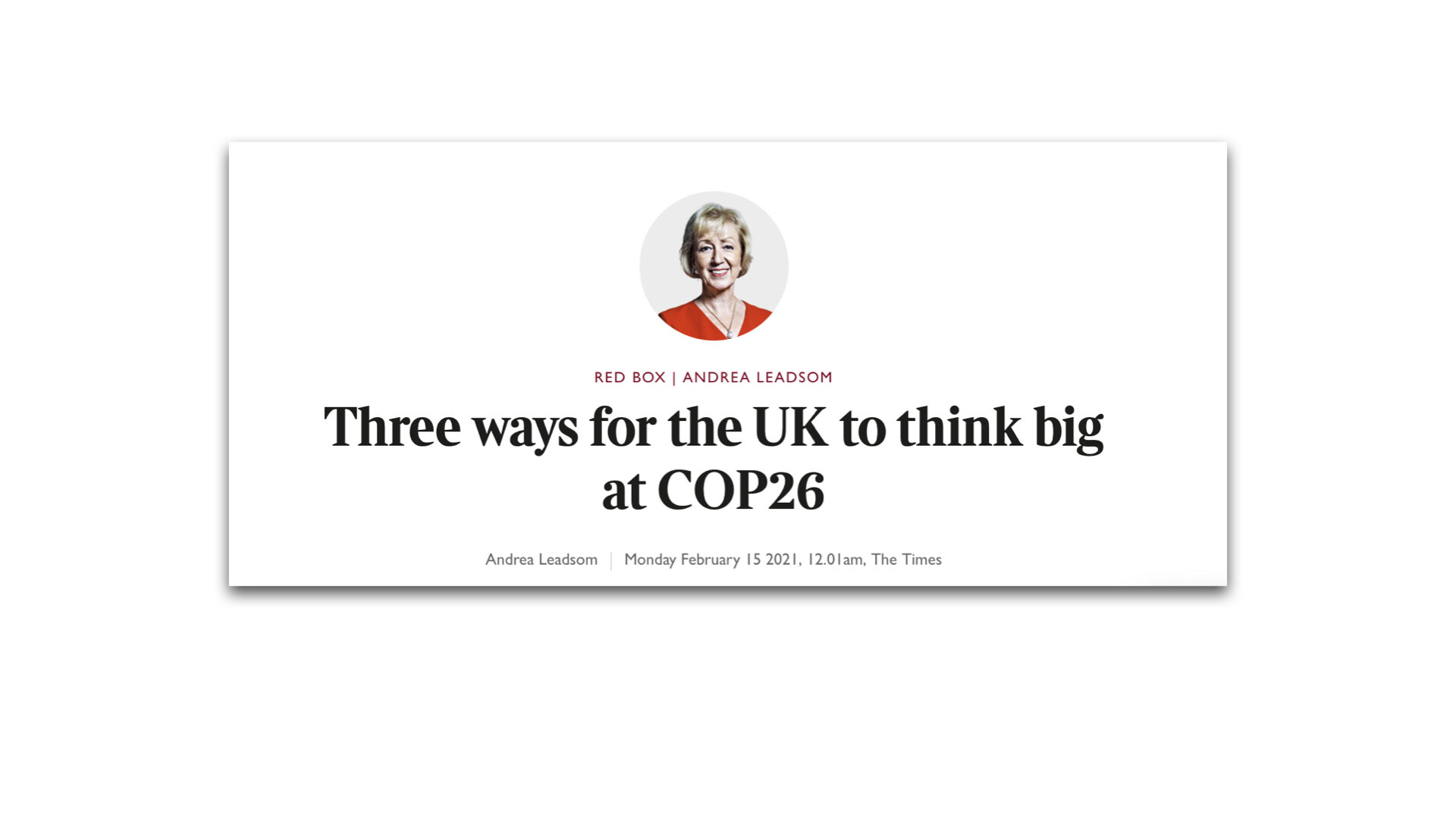Three ways for the UK to think big at COP26

A year since Boris Johnson’s first cabinet reshuffle, Covid-19 has understandably overtaken every agenda. But, now as we start to emerge from the dark days of the pandemic, it is time to refocus our energies.
President Biden’s rejoining of the Paris Accord, complete with the announcement that America will host a climate leaders’ summit on Earth Day demonstrates a new US commitment to a greener world.
And now that my colleague Alok Sharma is focused on his role as president of COP26 rather than combining it with leading the business, energy and industrial strategy (BEIS), which was never going to work, we have a real shot at the UK leading the world in the fight against global warming. But I worry that it must not become too little too late.
It takes time and real impetus to agree major action on the global stage.
Five years on from the Paris Agreement, when 185 countries resolved to restrict global warming, COP26 hosted in the UK offers us the chance to demonstrate post-Brexit global leadership. We can prove wrong all those who claimed leaving the EU would downgrade our environmental commitments.
During my own time as secretary of state for BEIS, I refocused the department’s strategic plans, setting our number one priority as leading the world in tackling global climate change. We need radical action at COP26 — ambitious, world-changing initiatives that will put us on the path to save our planet.
My challenge to COP26 is to think big and I have three suggestions. First, launch a yearbook to be updated annually where every signatory of the Paris Agreement records in brief their greatest achievements at national level, local state level, and within their business/voluntary sector. Transparency for all to see, yes, and to challenge, without the constant bickering among COP delegates about units of measurement and who should be doing more.
From the superb deployment of hydroelectricity in Scandinavia to the heroes of the hour AstraZeneca, who have pledged to be carbon neutral by 2030, from the efforts in Chile to use their natural sunshine resources to oil giant BP who have committed to zero emissions by 2040 — a yearbook would provide a record of achievements big and small that others would learn from and copy. And for those of our citizens who worry constantly about our planet, it would provide some truth and some context for their campaigns.
Second, long before Brexit, the UK was established among the top three nations in “soft power” — the non-economic, non-military influence within the world. What better way to use this global influence than through three ambitious bilateral commitments to decarbonisation launched at COP26. The UK should seek three eye-catching agreements with big global emitters that could include, for example, pledges with India, China and Brazil respectively to deliver, around the globe, 100GW of battery storage, 200GW of offshore wind and 500 million hectares of new woodland by 2030.
These commitments could spark massive outperformance, just as we found when the UK committed in 2015 to take coal off the grid by 2025 — here we are only in 2021 and the job is almost done.
Third, the UK is home to the world’s leading financial services sector and in our post-EU global outreach, we should be ambitious in developing a global green investment bank. Boris appointed “rock star central banker” Mark Carney as COP26’s green advisor but there’s much we can do to move the dial in international finance. A green investment bank could pull together the investment expertise of the global pensions industry with the project financing skills of infrastructure investors to enable projects big and small and invest in the UK’s brilliant science capacity to dramatically improve our lives and those around the world. From solar stoves to reduce the felling of trees, for example, to carbon capture usage and storage to decarbonise natural gas resources and the development of small modular nuclear reactors to provide base load electricity.
The UK can be a force for good in the world, helping to improve the quality of life for those in polluted city centres and protecting vital natural resources that are fast disappearing. At the same time, we can grow our green economy with thousands of new jobs and skills, offering new hope as we look to the future.
The prime minister is committed to building back better so let’s make 2021 a year of global renewal. For our planet, for our young people’s future and for the United Kingdom.





